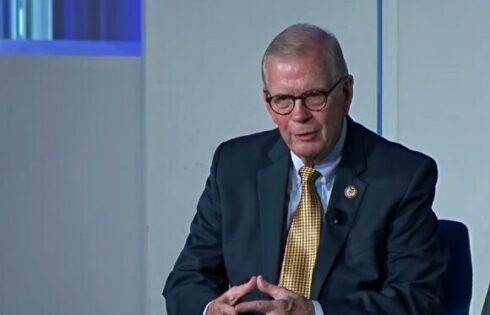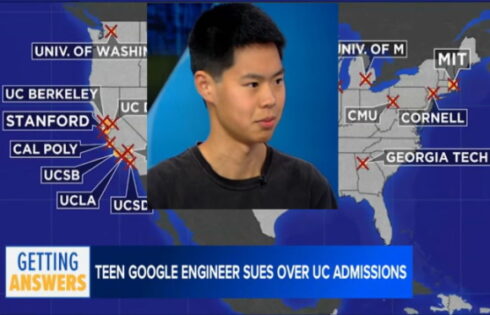
‘Civilization’ is at stake
More than 12 years after William Felkner was forced to choose between staying in his graduate program and obeying his conscience, the former student has a chance to protect the First Amendment rights of students nationwide.
That’s according to a friend-of-the-court brief filed last month by the Cato Institute, Foundation for Individual Rights in Education and National Association of Scholars in Felkner’s lawsuit against Rhode Island College, a public institution.
If the Rhode Island Supreme Court doesn’t overturn a trial court ruling against Felkner, “public college administrators will be presented with a road map for an end-run around decades of First Amendment jurisprudence governing student speech rights,” the groups warn the high court.
Rhode Island college students in particular would be harmed, the brief claims: Administrators would have “vast discretion to censor critical, dissenting, joking, or merely inconvenient speech simply by citing vague, subjective ‘professional standards.’”
Lobby for gay marriage or get out
Felkner was a graduate student of social work in 2004 when he was threatened with failing grades if he refused to lobby the Rhode Island General Assembly for progressive policies.
Students in the Social Work Policy and Organizing program were given the option to lobby for social welfare issues or the legalization of gay marriage.
MORE: Student punished for criticizing lesbian movie can sue college
When Felkner expressed his dismay, a professor suggested in an email that he should consider a different profession due to his conservative leanings.
One of the program’s requirements was an internship that promoted an even further progressive agenda. When Felkner refused to participate in one of the suggested internships, the chair of the Master of Social Work Department told him he would be dismissed from the program.
Yes, there was a ‘genuine factual dispute’
The groups told the Rhode Island Supreme Court they want to intervene in the case, which dates back to 2007, “because it concerns the contours of a student’s right to freedom of expression and freedom of conscience at a public institution.”
The trial court wrongly decided there was no “genuine factual dispute” between Felkner and the school around whether he was actually forced to lobby against his beliefs, according to the brief.
For example, asked in a deposition whether “the school was going to tell [students] which position they had to lobby on,” a social work administrator answered “Yes.” The court violated its obligation to view evidence “in the light most favorable to the nonmoving party,” which is Felkner, the groups say.
MORE: Conservative student can sue school for punishing him for his views
The First Amendment does not let the government force individuals to lobby for a position they oppose, the brief says, citing the U.S. Supreme Court’s 2001 United Foods decision.
In that case, the majority said a law that forced mushroom growers to pay for mushroom-promoting ads amounted to unlawful “compelled speech.”
College students are not children, and this isn’t the classroom
The trial court also improperly applied a legal standard known as Hazelwood that’s only applicable below the college level, and which governs “school-sponsored expressive activities” by students, the brief says.
Felkner is in “essentially the same position as Hazelwood School District,” according to the groups.
MORE: ‘Professional standards’ is code for censoring conservative students
Rhode Island College ordered him to lobby for the program’s ideological view, outside the classroom, creating “the risk that people who were not involved with the class would view Felkner’s speech as his own opinions.”
In a blog post, Cato’s Ilya Shapiro says the trial court conflated a school’s right to “restrict children’s speech that the public might reasonably perceive to be the school’s speech” with the college’s demand that Felkner, a grown man, “profess a certain political ideology.”
‘Transgressing vague and subjective standards’ is your right
The brief notes that FIRE has received thousands of reports of censorship on campus since its 1999 founding, even though the Supreme Court has repeatedly protected free expression in higher education. (FIRE’s Will Creeley writes in a blog post that it has interceded on Felkner’s behalf since 2005.)
Litigation by FIRE and other groups has created “a virtually unbroken string of cases affirming the critical importance of First Amendment protections for college students,” and yet colleges continue to trample students’ speech rights, the brief says.
“The right to speak one’s mind without fear of official reprisal for transgressing vague and subjective standards should be beyond question on an American public campus,” it says.
The trial court’s “meager understanding” of that right threatens not only higher education but “our civilization.”
MORE: Next generation of academics may not be able to fight censorship
Like The College Fix on Facebook / Follow us on Twitter
IMAGE: pathdoc/Shutterstock





Please join the conversation about our stories on Facebook, Twitter, Instagram, Reddit, MeWe, Rumble, Gab, Minds and Gettr.